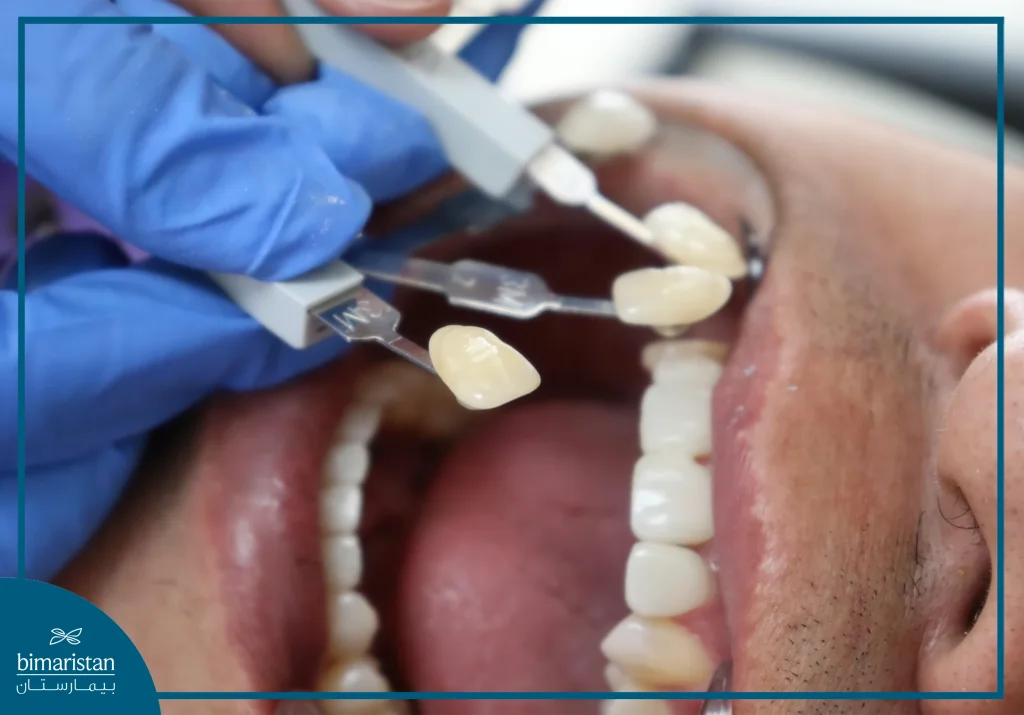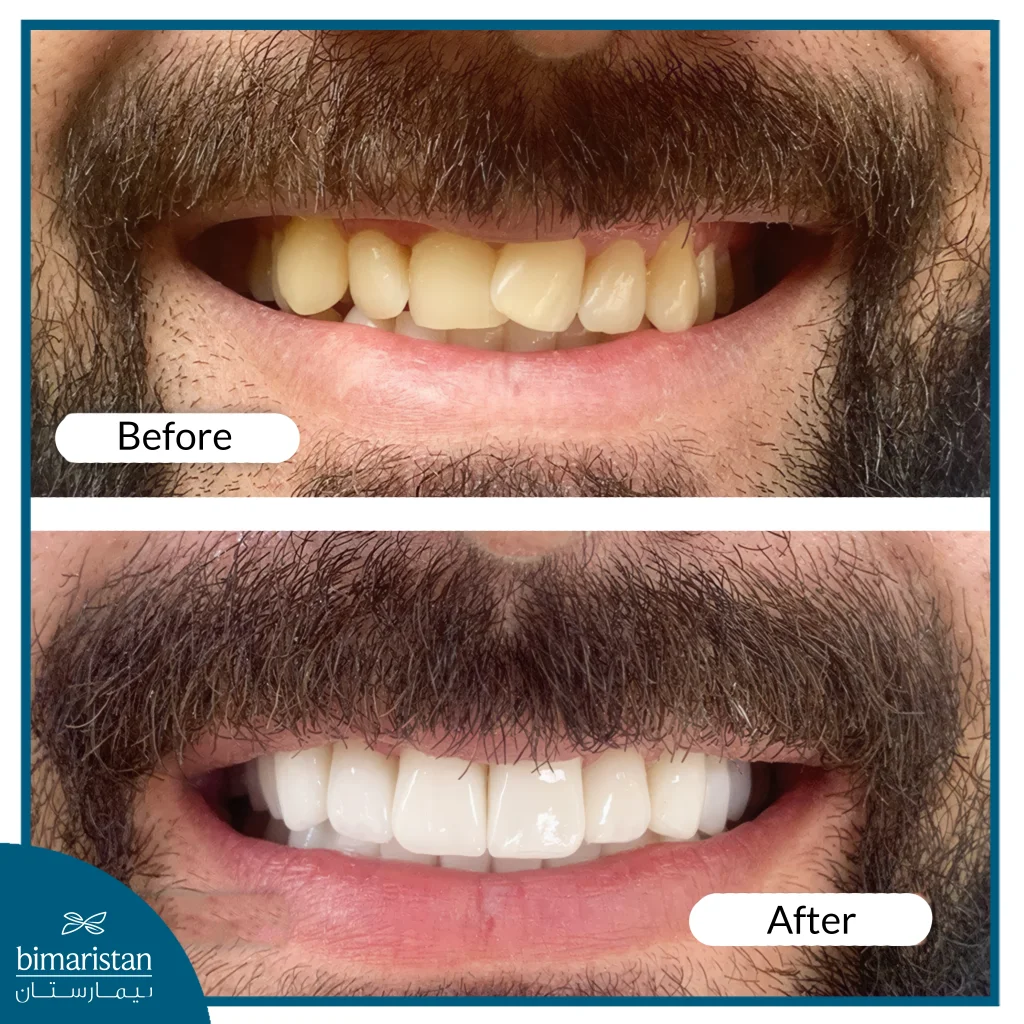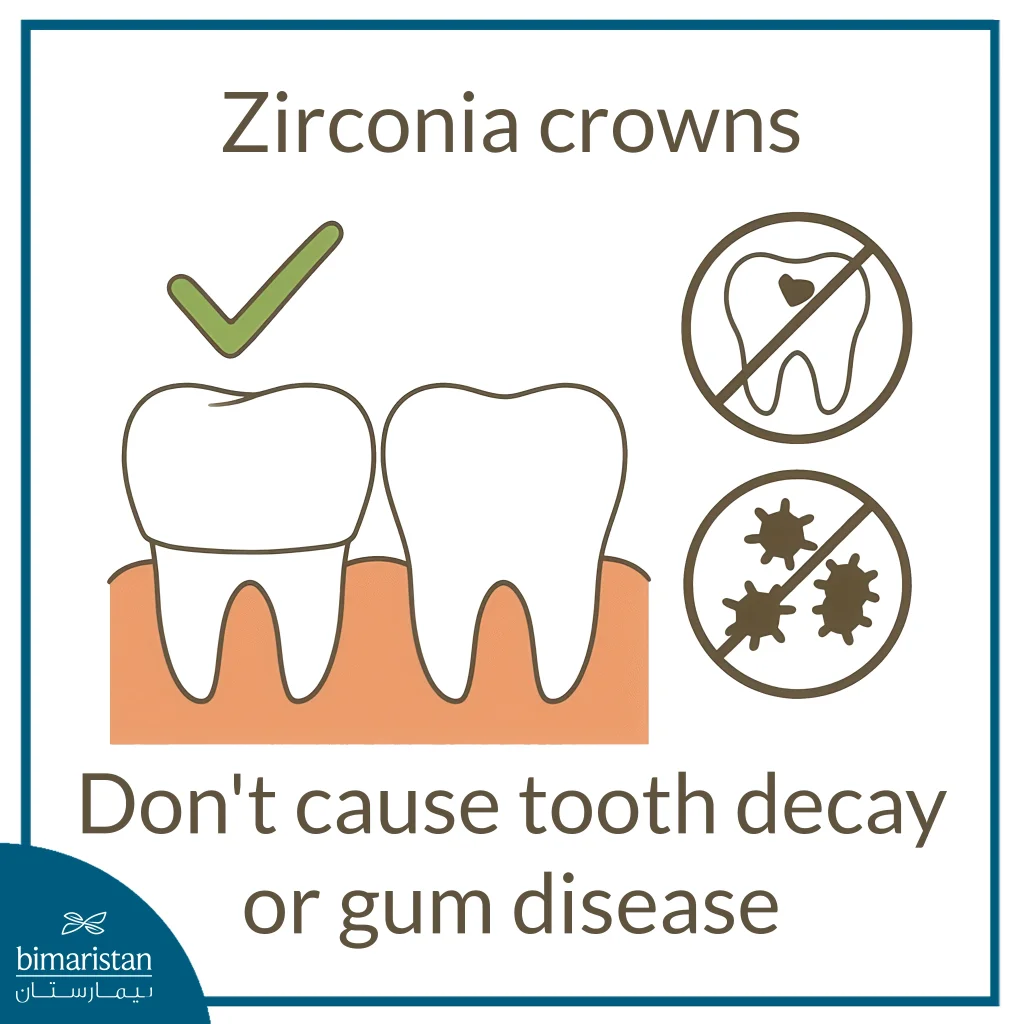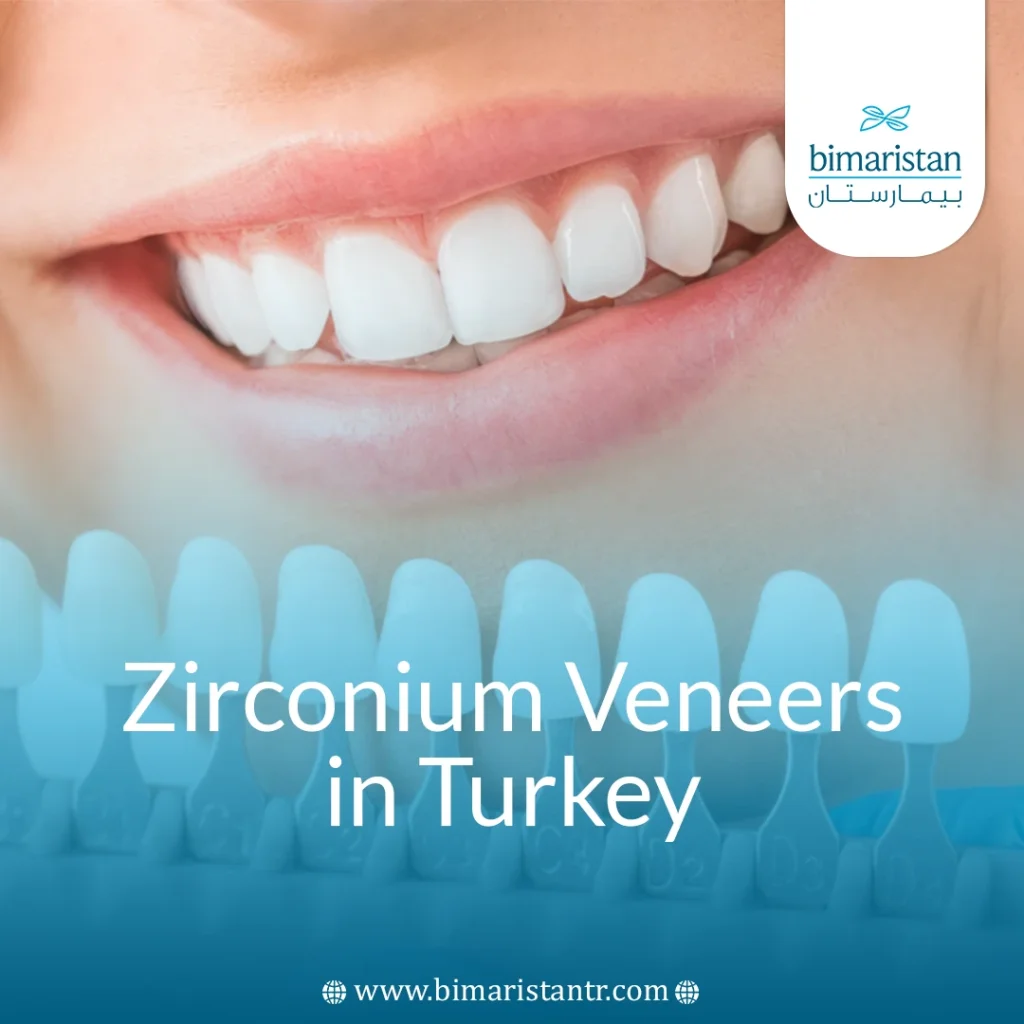In recent years, zirconium veneers in Turkey have become the ideal choice for thousands of patients around the world, where more than 500,000 procedures are performed annually, thanks to precision and high quality. Turkish clinics offer the latest types of zirconium veneers with advanced digital techniques, with a success rate exceeding 95% according to studies by the European Dental Implant Association. This excellence has made Turkey the first destination for medical tourism in the field of cosmetic dentistry.
With different types of zircon crowns and varying prices, Turkey stands out with a unique competitiveness, as zircon crown prices are 70% lower than in European countries. Leading clinics rely on world-class materials, offering up to 15 years of warranty, ensuring patients enjoy long-lasting results. If you are looking for a perfect smile at an affordable cost, zirconium veneers in Turkey are the perfect solution for you.
What are zirconium veneers?
Zirconium veneers are a type of dental crowns made of zirconium dioxide (ZrO2), which is a durable ceramic material that resembles natural teeth in shape and color to some extent, and is used to restore broken or eroded teeth, in addition to being used after root canal treatment, or in cases of smile makeovers, and can be used with bridges to strengthen multiple teeth. Individuals who prefer cosmetic dentistry usually prefer zirconium inlays, as they are compatible with the gums and do not cause irritation or sensitivity.

Difference between complete zirconium and porcelain-coated zirconium
Zirconium veneers are one of the latest cosmetic and functional solutions in dentistry. The types of zirconium inlays vary between full zirconium and porcelain-coated zirconium to meet different treatment needs, and each type is characterized by its own unique properties:
- Complete zirconium: Made entirely of zirconium dioxide, it does not have an outer ceramic layer, but it is nonetheless highly durable, minimizing tooth wear, and has excellent biocompatibility with the gums and does not cause allergic reactions.
- Porcelain-coated zirconium: It consists of two layers, an inner layer made of zirconium and an outer layer made of dental porcelain. These inlays are less durable than full zirconium inlays, but are more aesthetically pleasing as they mimic the transparency of natural teeth, making them more preferable for front teeth.
Specialists recommend using full zirconium for back teeth, due to its high strength and durability compared to porcelain-coated zirconium, and on the contrary, doctors recommend using porcelain-coated zirconium for front teeth, due to its transparency that mimics natural teeth, but it should be borne in mind that the possibility of breaking porcelain is high in the long run.
Why is Turkey a leading destination for Zirconium veneers?
Turkey is one of the world’s leading destinations in the field of zirconium veneers in Turkey, as Turkey is distinguished from Europe and America by many factors that make a person prefer to choose it to start his journey in cosmetic dentistry, because Turkey combines a unique combination of high quality, relatively low cost, and advanced medical expertise, and the combination of these factors together is what distinguishes Turkey from the rest of its competitors.
Zirconium veneers in Turkey are crafted by doctors specialized in cosmetic dentistry, using modern technologies such as CAD/CAM to design zirconia crowns with high precision, in addition to the high aesthetic results and long-term guarantee that one gets when choosing Turkey as a medical tourism destination.
Types of Zirconium veneers available in Turkey
There are a variety of zirconium veneers in Turkey that are of high quality, as these inlays meet both the aesthetic and functional needs of the teeth, and each of these types is characterized by distinctive characteristics and The most prominent veneers available in Turkey are:
- Translucent Zirconia
- High Strength Zirconia
- Layered Zirconia
The choice of types of Zircon veneers varies according to the needs of each individual, as it depends on the location of the tooth to be treated and the available budget, in addition to the main goal, whether cosmetic to improve the appearance or functional to strengthen and protect the tooth, and Turkey offers a wide variety of these types to meet all these requirements with high quality and competitive prices.
Features of each type of zirconium plating
Each type of Zirconia inlay has its own characteristics. Some of these inlays are used for cosmetic purposes, others are used to improve and strengthen the tooth, and the financial factor of the person plays a big role in choosing one of these inlays over others.
Translucent Zirconia: For natural beauty
This type of zirconia veneer is the perfect choice for a natural dental aesthetic, as it is characterized by a transparency that mimics the color of natural enamel, making it look completely natural, in addition to its high resistance to breakage, making it the preferred choice for balancing beauty and durability.
High Strength Zirconia: For back teeth
Combining durability and biocompatibility with high fracture resistance, this type of Zirconia is three times stronger than traditional porcelain and is ideal for withstanding high chewing pressures in the back of the mouth. All of these properties make it the most suitable option for posterior teeth.
Layered Zirconia: A realistic look for front teeth
This type of zirconium inlay is considered a masterpiece in the world of cosmetic dentistry, as it consists of 3-5 layers of zirconium oxide, perfectly mimics the natural structure of enamel and dentin, and has a natural color gradient and beautiful light reflection, making it the perfect choice for the front teeth.

Do zirconium veneers cause a bad odor?
Zirconium crowns do not directly cause bad odor, as the zirconium compound is chemically inert and does not react with saliva, but there are some indirect causes that may lead to unpleasant odors from the mouth:
- Accumulation of bacteria: Failure to clean the crown properly can lead to a buildup of food debris and bacteria, causing an unpleasant odor.
- Saliva leakage or decay under the crown: Leaking saliva or food debris can lead to decay of the underlying tooth under the crown.
- Diseases of the gums: Inflammation around the gums.
These causes can be avoided, as bacteria buildup can be prevented by careful brushing and flossing, and infections around the gums can be treated with antiseptic rinses. If a bad odor appears after a crown is placed, it is best to see a dentist immediately to ensure the integrity of the crown and the underlying tooth.

Who are zirconium veneers suitable for?
Zirconium veneers are a suitable option for many dental conditions, as they are an ideal solution that combines durability and aesthetics, and these inlays are suitable for many dental conditions ranging from front teeth that need a natural appearance to back teeth that require high durability, and the most prominent cases in which individuals resort to Zirconium inlays are:
- People looking for a natural cosmetic solution: These veneers are an ideal solution to enhance the appearance of the front teeth, creating a Hollywood smile.
- Patients with metal allergies: Zirconium is a chemically inert and hypoallergenic compound.
- Patients who need strong and durable crowns: They can withstand a great deal of pressure, making them ideal for many cases, such as posterior teeth.
However, it is not suitable for everyone, as there are several conditions that prevent zirconia crowns, such as advanced gum disease or weak tooth structure, and they are a more expensive option than metal crowns, making them unsuitable for those looking for less expensive options.
Do zirconium crowns cause sensitivity or gum discoloration?
Zirconium veneers do not cause allergies or gum discoloration in normal cases, as Zirconium is chemically inert and does not interact with body tissues, so it does not cause allergies in any form. In addition, Zirconium does not cause blackening or discoloration of the gums as in metal crowns.
Can Zirconium be coated over dental implants?
Fortunately, zirconium can be cemented over dental implants, but this requires a period of time after implantation, as the titanium implant must be fixed in the jawbone for approximately 3-6 months to fuse with the jawbone before being cemented with zirconium.
Steps of zirconium veneers in Turkey
The process of installing zirconium veneers in Turkey is characterized by high professionalism and superior aesthetics, as specialized clinics follow precise protocols that ensure long-lasting results. The journey begins with a comprehensive consultation session during which the doctor evaluates the condition of the teeth using 3D imaging techniques and digital radiology, which helps determine the type of inlay suitable for the patient, whether it is full Zirconium inlays for strong chewing or transparent laminates for the front teeth, after which the tooth is carefully prepared while preserving as much of its original structure as possible, followed by taking accurate measurements using a scanner inside the mouth, to send the data to the dental laboratory connected to the clinic digitally.
In the second stage, lab technicians meticulously design the crown using the latest CAD/CAM systems, focusing on achieving the optimal balance between durability and aesthetics. A few days later, the patient returns to the clinic for the final fitting after a careful check for color and shape matching, which is secured using high-quality medical adhesives that ensure long-lasting stability. Turkish clinics offer a long warranty on Zirconium veneers, usually up to 10-15 years, with periodic follow-ups to ensure patient comfort and stability of results, combining precision and clinical expertise, making Turkey a leading destination in the field of cosmetic and functional dentistry.
CAD/CAM digital design technology in Turkey
This technology is a digital system used to design and manufacture dental structures with high precision (such as zirconium crowns and bridges), relying on computer software and 3D printers to accomplish this design, and the process is divided into 4 steps:
- Digital Mouth Scan: A digital camera is used to scan the inside of the mouth.
- Design: The doctor designs the crown or bridge using specialized software.
- Manufacturing: Done in hours with this technology.
- Final dressing: The crown is specially treated and then secured with medical adhesives.
This process is characterized by high accuracy compared to the traditional method, as it is 90% more accurate, requires less time compared to traditional methods, and gives better aesthetic results because it mimics the natural shape of the teeth.
Zirconium veneers cost in Turkey compared to other countries
The prices of zirconium plating in Turkey are very suitable compared to those in America and other European countries. In addition, the treatment period in Turkey is shorter, allowing those seeking medical tourism to return home quickly. Zirconium veneers in Turkey typically require only 3–7 days, while in America and Europe, the process takes about 2–4 weeks, making Turkey a preferred destination for zirconium veneers.
Additionally, the prices of zirconium crowns in Turkey are affordable for most people, with the cost ranging from $100-150 per tooth in Turkey, compared to $500-1,000 in the US and $500-800 in Europe. This makes Turkey the ideal choice for anyone starting their zirconium crown journey.
Finally, Bimaristan Medical Center is your ideal destination for zirconium veneers in Turkey, combining medical precision with aesthetic beauty. We are committed to providing comprehensive treatment solutions that begin with an accurate diagnosis and end with a bright smile that lasts for years. Thanks to our specialized medical staff and the latest technologies, we guarantee exceptional results that exceed expectations. At Bimaristan, your comfort and the beauty of your smile are our top priorities because we believe that every smile has a story worthy of being told with confidence and perfection.
Sources:
- American College of Prosthodontists (ACP). (2023). Zirconia crowns: Types, benefits, and clinical applications.
- WebMD. (2023, June 10). Zirconia crowns: Types, costs, and durability.
